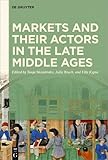Markets and their Actors in the Late Middle Ages / ed. by Julia Bruch, Ulla Kypta, Tanja Skambraks.
Material type: TextPublisher: Berlin ; Boston : De Gruyter, [2020]Copyright date: ©2021Description: 1 online resource (VI, 150 p.)Content type:
TextPublisher: Berlin ; Boston : De Gruyter, [2020]Copyright date: ©2021Description: 1 online resource (VI, 150 p.)Content type: - 9783110642216
- 9783110642421
- 9783110643756
- HF5471 .M37 2021
- online - DeGruyter
- Issued also in print.
| Item type | Current library | Call number | URL | Status | Notes | Barcode | |
|---|---|---|---|---|---|---|---|
 eBook
eBook
|
Biblioteca "Angelicum" Pont. Univ. S.Tommaso d'Aquino Nuvola online | online - DeGruyter (Browse shelf(Opens below)) | Online access | Not for loan (Accesso limitato) | Accesso per gli utenti autorizzati / Access for authorized users | (dgr)9783110643756 |
Frontmatter -- Table of Contents -- Introduction -- How to Study the Premodern Market: The Concept of Market Exchange -- Towards a Different Type of Market Exchange in the Early Middle Ages: The Sacrum Commercium and its Agents -- Imagined Investors: Markets, Agents, and the Saxon Mining Administration -- The “destroyers of trade”, “our good and dear Inhabitants”, and “all persons of what quality or nation however they may be”: Early Modern Colonial Market Culture -- Markets and their Agents in History: Some Theoretical Reflections -- List of authors -- Index of names -- Index of places
restricted access online access with authorization star
http://purl.org/coar/access_right/c_16ec
Markets feature prominently in recent research of premodern historians as well as economists. Discussions cover the questions, for example, how a market can be grasp as a place, an event or a mechanism of exchange, or whether premodern economies have just hosted markets or if some of them can even be regarded as market economies. The proposed volume will now turn to the agents who forged and connected markets. Exchange was done between persons and with the help of persons: Artisans, retailers and poor people tried to better their living conditions by engaging on the market, merchants interconnected different markets, urban personnel (such as brokers, men working at the public scales, or the town council as a whole) regulated and facilitated exchange. By focusing on economic practices and the agents who performed them, the volume aims at analyzing the specific characteristics of premodern markets, the reasons why people became active on the market and the institutions which formed exchange processes and were in turn shaped by them.
Issued also in print.
Mode of access: Internet via World Wide Web.
In English.
Description based on online resource; title from PDF title page (publisher's Web site, viewed 01. Dez 2022)


